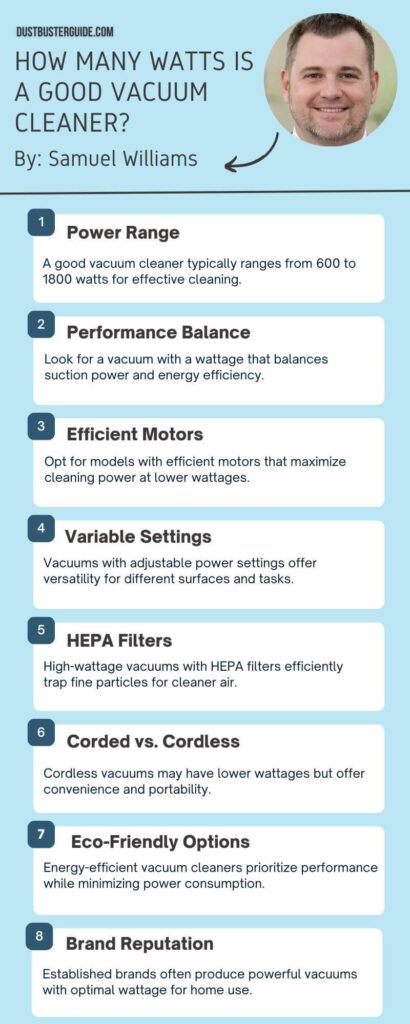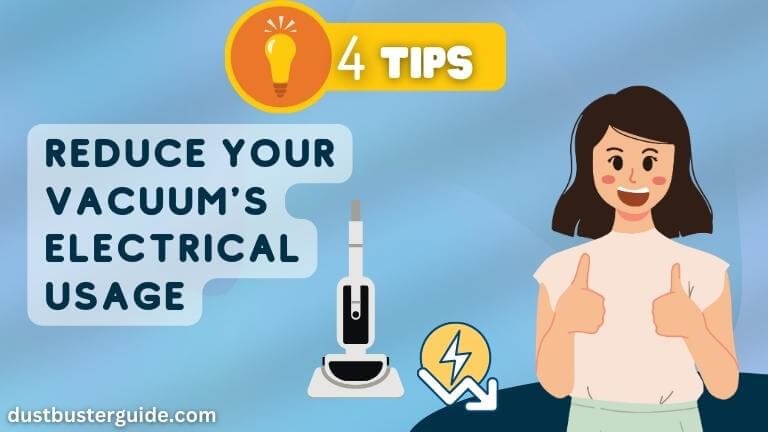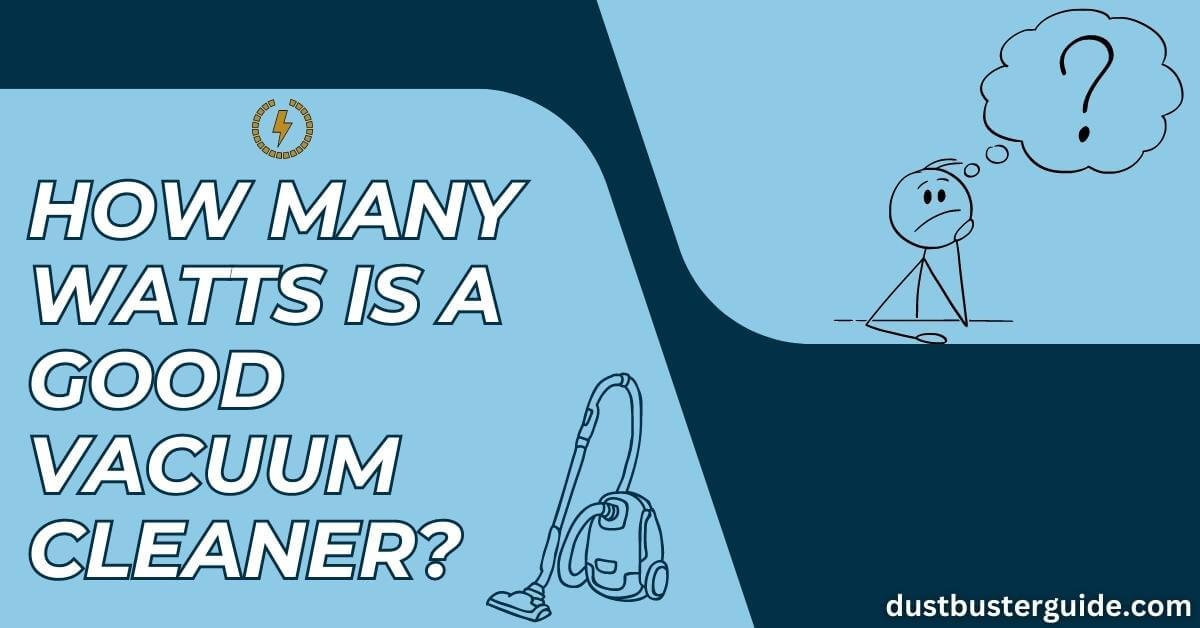Ever wondered about the unsung hero in the world of cleanliness, the vacuum cleaner, and the mysterious realm of watts it inhabits? The quest for the perfect cleaning companion takes us on a journey beyond suction power and into the enigmatic world of electrical wattage. how many watts is a good vacuum cleaner becomes the riddle we’re about to unravel, unveiling the secrets that hide behind the sleek designs and powerful suctions.
Join us as we embark on an adventure to understand the science behind those hums and whirs, demystifying the wattage wonders that make a vacuum cleaner not just a household gadget, but a marvel of modern cleaning technology. Get ready to flip the switch and dive into the electrifying exploration of the unsung powerhouse of tidiness!
How Many Watts Is A Good Vacuum Cleaner – Explained
So, how many watts is a good vacuum cleaner? If you’re looking for a powerful vacuum cleaner, you’ll want to find one that has a wattage of at least 1500 watts.
A vacuum cleaner with this wattage will have enough power to effectively clean your floors and carpets, even if they’re heavily soiled.
The higher the wattage, the stronger the suction power, which means it’ll be able to pick up more dirt and debris. Additionally, a vacuum cleaner with a higher wattage will also be more efficient at removing pet hair and allergens from your home.
So, if you want a vacuum cleaner that can tackle any cleaning task with ease, look for one with a wattage of at least 1500 watts.

What Are The Variables That Make Up The Watt Of A Vacuum Cleaner
The different components that determine the power of a vacuum cleaner include its motor, suction strength, and overall efficiency.
- The motor is the heart of the vacuum cleaner, responsible for generating the power needed to create suction. A more powerful motor will generally result in better cleaning performance.
- The suction strength is another crucial factor, as it determines how effectively the vacuum cleaner can lift dirt and debris from various surfaces. A vacuum cleaner with high suction strength will be able to tackle tough messes with ease.
- Lastly, the overall efficiency of the vacuum cleaner plays a significant role in its wattage. An efficient vacuum cleaner will be able to achieve the desired cleaning results using less power, making it more energy-efficient and cost-effective in the long run.
Considering these variables will help you determine the appropriate wattage for a good vacuum cleaner that suits your cleaning needs.
Does Wattage Affect A Vacuum Cleaner’s Suction Power?
To truly understand the suction power of a vacuum cleaner, imagine yourself effortlessly lifting stubborn dirt and debris from every nook and cranny of your home.
Now, let’s talk about how wattage affects a vacuum cleaner’s suction power. The wattage of a vacuum cleaner is an important factor to consider, as it directly impacts the suction power. Generally, a higher wattage indicates a more powerful motor, which leads to stronger suction.
However, it’s not the only factor to consider. The design of the vacuum cleaner, the type of brush bristles, the filtration system, and the overall efficiency of the machine also play a role in determining the suction power.
So, while wattage is an important consideration, it’s essential to also look at other features and factors that contribute to a vacuum cleaner’s overall performance.
Factors To Consider When Choosing Wattage For A Vacuum Cleaner
When choosing the wattage for your vacuum cleaner, consider these factors:
1. Size Of Your Living Space
If you have a smaller living space, such as an apartment or a studio, a vacuum cleaner with lower wattage may be sufficient. However, if you have a larger home with multiple rooms, a vacuum cleaner with higher wattage may be more effective in cleaning a larger area.
2. Type Of Flooring
The type of flooring in your home also plays a role in determining the wattage you need for your vacuum cleaner. If you have carpets or rugs, a higher-wattage vacuum cleaner may be necessary to provide enough suction power to remove embedded dirt and debris. On the other hand, if you have mostly hard floors, such as hardwood or tile, a lower-wattage vacuum cleaner may be sufficient.
3. Frequency Of Use
If you plan on using your vacuum cleaner frequently, especially in high-traffic areas, or if you have pets that shed a lot, a higher-wattage vacuum cleaner may be beneficial. It’ll provide more suction power to effectively clean up dirt, pet hair, and other debris.
4. Additional Features
Some vacuum cleaners come with additional features, such as brush attachments, adjustable suction settings, or HEPA filters. These features may require higher wattage to operate effectively. Consider the specific features you need and make sure that the wattage of your vacuum cleaner can support them.
Remember, wattage isn’t the only factor to consider when choosing a vacuum cleaner. It’s important to also consider the brand reputation, customer reviews, and overall performance of the vacuum cleaner to ensure that it meets your cleaning needs.
Benefits Of A Vacuum Cleaner With Higher Wattage
One major advantage of opting for a vacuum cleaner with higher wattage is that it provides superior suction power, making cleaning a breeze. With higher wattage, the vacuum cleaner is able to generate more power, resulting in stronger suction. This means that it can effectively pick up dirt, dust, and debris from various surfaces, including carpets, rugs, and hard floors.
The increased suction power allows for a more thorough and efficient cleaning, saving you time and effort. Additionally, a vacuum cleaner with higher wattage is often equipped with advanced features and technologies that enhance its performance, such as improved filtration systems and better brush agitation. These features help to ensure that even the smallest particles are captured, leaving your floors and surfaces spotless.
So, if you want a vacuum cleaner that can tackle tough cleaning tasks with ease and deliver outstanding results, opting for one with higher wattage is definitely the way to go.
Drawback Of A Vacuum Cleaner With High Wattage
Looking for a vacuum cleaner with superior suction power? Well, before you make your decision, it’s important to consider the drawback of opting for a model with high wattage.
While a vacuum cleaner with high wattage may provide excellent suction, it also consumes a significant amount of energy. This means that it will contribute to higher electricity bills compared to a vacuum cleaner with lower wattage.
Additionally, high-wattage vacuum cleaners tend to be heavier and bulkier, making them more difficult to maneuver and store. They may also produce more noise during operation, which can be disruptive, especially in smaller living spaces.
Lastly, high-wattage vacuum cleaners may not necessarily equate to better cleaning performance. Other factors, such as the design of the vacuum cleaner, the efficiency of the filtration system, and the quality of the attachments also play a crucial role in determining its cleaning effectiveness.
So, before you decide on a vacuum cleaner, make sure to weigh the drawbacks of high wattage against its benefits to find the right balance for your cleaning needs.
What Is The Difference Between The Wattage And Amerage In A Vacuum Cleaner
Unraveling the power puzzle in vacuum cleaners, let’s delve into the difference between wattage and amperage.
When it comes to understanding the power of a vacuum cleaner, it’s important to distinguish between these two terms. Wattage refers to the amount of power the vacuum cleaner consumes, which directly affects its cleaning performance. Higher wattage generally means a more powerful suction and better cleaning efficiency.
On the other hand, amperage measures the current flowing through the vacuum cleaner’s motor. While wattage indicates the overall power consumption, amperage determines the load on the electrical circuit. It’s crucial to consider both factors when choosing a vacuum cleaner, as a high-wattage model with low amperage can still deliver excellent cleaning performance while being energy-efficient.
So, when comparing vacuum cleaners, keep in mind that wattage measures power consumption, while amperage indicates the electrical load.
How Many Amps Does A Dyson Vacuum Use?
Discover the incredible power and efficiency of a Dyson vacuum as it effortlessly utilizes the perfect amount of amps to transform your cleaning routine.
Dyson vacuums are known for their cutting-edge technology and intelligent design, which allows them to provide exceptional cleaning performance while consuming the optimal amount of power.
The exact number of amps a Dyson vacuum uses can vary depending on the model and specific cleaning mode being utilized. However, on average, Dyson vacuums typically use around 10-12 amps, which is considered to be a moderate amount of power. This ensures that the vacuum has enough power to effectively clean various surfaces, while still being energy-efficient.
Whether you’re tackling carpets, hardwood floors, or upholstery, a Dyson vacuum will deliver outstanding suction power and pick up dirt, debris, and pet hair with ease.
So, say goodbye to the days of struggling with a weak and inefficient vacuum cleaner, and embrace the power and convenience of a Dyson vacuum.
How Many Amps Does A Shark Vacuum Use?
Get ready to experience the incredible power and efficiency of a Shark vacuum as it effortlessly revolutionizes your cleaning routine with its optimal amp usage.
When it comes to the amps, a Shark vacuum typically uses between 9 to 12 amps, depending on the model. This makes it a reliable and energy-efficient option for tackling even the toughest cleaning tasks in your home.
With its powerful suction and innovative features, a Shark vacuum can easily pick up dirt, dust, and debris from various surfaces, leaving your floors and carpets looking spotless.
Plus, with its lightweight design and maneuverability, you can effortlessly glide the vacuum around your home, reaching every nook and cranny with ease.
So, say goodbye to the days of struggling with heavy and inefficient vacuums and say hello to the exceptional performance of a Shark vacuum.
Wattage Comparison Of Upright Vs. Canister Vacuum Cleaners
Comparing the wattage of upright and canister vacuum cleaners will reveal which one reigns supreme in terms of power and efficiency. When it comes to wattage, upright vacuum cleaners generally have a higher wattage compared to canister vacuum cleaners. This means that upright vacuums have more power and are capable of providing stronger suction.
The higher wattage enables upright vacuums to effectively clean carpets, as they can easily pick up dirt, debris, and pet hair embedded deep within the carpet fibers. On the other hand, canister vacuum cleaners usually have a lower wattage but compensate for it with their versatility and maneuverability.
Canister vacuums are great for cleaning hard floors, stairs, and upholstery, thanks to their lightweight design and flexible hoses. Despite their lower wattage, canister vacuums can still deliver efficient cleaning performance.
Ultimately, the choice between an upright and a canister vacuum cleaner depends on your specific cleaning needs and preferences.
How To Determine How Many Watts Your Vacuum Cleaner Needs
Now that you know the wattage comparison between upright and canister vacuum cleaners, let’s move on to the next step: determining how many watts your vacuum cleaner actually needs.
To make it easier for you, here are some points to guide you through the process.
- First, consider the size of your living space and the amount of dirt and debris you typically have to clean. Smaller spaces with less dirt may require a lower wattage, while larger areas or homes with pets and heavy traffic might benefit from a higher wattage.
- Next, think about the type of flooring you have. Carpets and rugs generally require more suction power than hardwood or tiled floors.
- Additionally, take into account any special features or attachments you want your vacuum cleaner to have, such as a brush roll or upholstery tool, as these may affect the wattage needed.
- Lastly, read customer reviews and seek recommendations from experts to get a better understanding of the wattage range that is considered effective and reliable for vacuum cleaners.
By considering these factors, you’ll be able to determine the right wattage for your vacuum cleaner and ensure efficient cleaning performance.
Wattage Recommendations For Different Flooring Types
Consider the wattage recommendations for different types of flooring to ensure your vacuuming experience is efficient and effective.
When it comes to carpeted floors, a vacuum cleaner with higher wattage, such as 1500 watts or more, is recommended. This is because carpet fibers tend to trap dirt and debris more deeply, requiring more suction power to effectively clean them.
For hardwood or tile floors, a lower-wattage vacuum cleaner, around 1000 to 1200 watts, should suffice. These types of flooring are generally smoother and don’t require as much suction power.
However, if you have a combination of carpeted and hard floors, it is advisable to choose a vacuum cleaner with adjustable power settings, so you can switch between higher and lower wattage depending on the surface you are cleaning.
By considering the wattage recommendations for different flooring types, you can ensure that your vacuum cleaner is able to effectively clean your home and provide you with a hassle-free cleaning experience.
Does Wattage Affect the Noise Level Of A Vacuum Cleaner
Looking for a vacuum that won’t wake up the whole house? Let’s explore whether noise levels and wattage are correlated.
When it comes to vacuum cleaners, higher wattage often means more powerful suction, which is great for getting a thorough clean. However, it’s important to note that higher wattage can also mean louder noise levels. This is because the motor in the vacuum requires more power to operate at a higher wattage, which can result in a louder sound.
On the other hand, lower-wattage vacuum cleaners tend to produce less noise, but they may not have the same level of suction power. So, if you’re looking for a vacuum cleaner that is both powerful and quiet, it’s worth considering models that strike a balance between wattage and noise levels.
Do Vacuums Use A Lot Of Electricity?
The electricity usage of vacuums is generally considered moderate. Factors influencing consumption include the vacuum’s wattage, usage frequency, and energy efficiency. High-efficiency models with lower wattage can provide effective cleaning while minimizing power consumption. It’s advisable to check the vacuum’s Energy Star rating, if available, for an indication of its energy-efficient design. Additionally, adopting good vacuuming practices, such as keeping filters clean and using the appropriate settings for different surfaces, can contribute to more efficient energy use.
Can You Run A Vacuum Cleaner On 12 Amps?
Yes, you can run a vacuum cleaner on 12 amps. Amperage (amps) is a measure of the electric current flowing through the vacuum. Most household vacuums have a power rating in watts, and to determine the amps, you can use the formula: Amps = Watts / Volts. For example, if a vacuum is rated at 1,200 watts and operates on a standard U.S. voltage of 120 volts, it would draw 10 amps (1200W / 120V). Therefore, a vacuum cleaner drawing 12 amps is within a common range, and it should work effectively without exceeding typical household circuit capacities. Always check the vacuum’s specifications and adhere to safety guidelines to prevent electrical issues.
How To Power Vacuum Cleaner In Emergency
In an emergency situation without regular electrical power, powering a vacuum cleaner can be achieved through various methods. If you have a battery-powered vacuum, ensure it’s fully charged beforehand.
Alternatively, utilizing a car power inverter to connect the vacuum to a vehicle’s DC power or employing a generator can provide temporary power.
Additionally, considering manual or hand-powered vacuum options, as well as using corded vacuums with an extension cord connected to a portable power source, can offer alternatives.
Prioritize safety by following manufacturer guidelines and exploring non-electric cleaning methods in case using a vacuum is not immediately feasible during the emergency.
Tips On Reducing Your Vacuum’s Electrical Usage
To help save on your electric bill, here are some handy tips for reducing how much power your vacuum uses.

- First, consider using lower power settings when possible. Most vacuum cleaners have adjustable power settings, so using a lower setting can help reduce energy consumption.
- Additionally, make sure to clean or replace your vacuum filters regularly. Clogged filters can restrict airflow and force the vacuum to work harder, using more electricity.
- Another tip is to empty the vacuum bag or canister when it’s halfway full. A full bag or canister can reduce the vacuum’s efficiency and make it use more power.
- Lastly, try to vacuum efficiently by planning your cleaning route and tackling one area at a time. This way, you can avoid going over the same spot multiple times and save on energy usage.
Wattage And Vacuum Cleaner Maintenance: Longevity Considerations
You can increase the lifespan of your vacuum by regularly maintaining and monitoring its wattage.
- One important consideration is to clean or replace the filters regularly. Clogged filters can put strain on the motor, reducing its efficiency and potentially causing it to overheat.
- Additionally, it is recommended to check and clean the brush roll regularly. Hair, threads, and other debris can become tangled in the brush roll, causing it to jam or wear down prematurely.
- Another maintenance task is to empty the dust canister or replace the bag when it is full. Overfilling the canister or bag can restrict airflow and put a strain on the motor.
- Lastly, monitoring the wattage of your vacuum is important. If you notice a sudden increase in wattage or if it consistently operates at a higher wattage than usual, it may indicate a problem with the motor or other components.
Regular maintenance and monitoring of wattage can help ensure that your vacuum cleaner lasts for a long time.
Conclusion
So now you know how many watts is a good vacuum cleaner. When choosing a vacuum cleaner, wattage is a crucial factor to consider for optimal cleaning. Higher wattage means more power and better suction for effective cleaning on various flooring types.
However, wattage alone is not the sole consideration; factors like flooring type, noise levels, and energy efficiency should also be taken into account.
A higher-wattage vacuum cleaner offers benefits like deep cleaning, pet hair removal, and durability. For carpets, higher wattage is recommended, while lower wattage may be sufficient for hard floors. Noise levels and energy usage can vary regardless of wattage, so consider features like noise reduction and follow maintenance tips for efficiency.
FAQs
Can wattage affect a vacuum cleaner’s suction power?
Yes, wattage can affect a vacuum cleaner’s suction power. Higher wattage generally means stronger suction. However, other factors like design and technology also play a role in determining a vacuum cleaner’s overall performance.
What factors should be considered when choosing the wattage for a vacuum cleaner?
When choosing the wattage for a vacuum cleaner, consider factors like the size of your home, the type of flooring, and the level of dirt and debris. These factors will help determine the optimal wattage for your needs.
What are the benefits of a vacuum cleaner with higher wattage?
A vacuum cleaner with higher wattage offers several benefits. It provides more suction power, allowing for better and more efficient cleaning. It can tackle tough dirt, pet hair, and larger debris with ease.
What are the drawbacks of a vacuum cleaner with high wattage?
The drawbacks of a vacuum cleaner with high wattage include higher energy consumption, increased noise levels, and potential damage to delicate surfaces. It may also be heavier and more expensive than lower-wattage models.
Is there a correlation between noise levels and wattage in vacuum cleaners?
There is a correlation between noise levels and wattage in vacuum cleaners. Higher wattage often results in louder noise levels, so you may want to consider this if noise is a concern for you.
Is a higher-wattage vacuum cleaner better?
A higher-wattage vacuum cleaner doesn’t necessarily mean it’s better. The efficiency of a vacuum depends on various factors, including design, suction power, and overall performance.
Is 600 watts good for a vacuum cleaner?
A 600-watt vacuum cleaner can be effective, but the performance depends on the specific model and design. Consider factors like suction power, filtration, and additional features for a comprehensive assessment of the vacuum’s capabilities.

